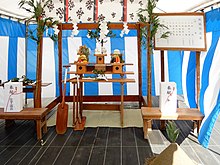Jichinsai
You can help expand this article with text translated from the corresponding article in Japanese. (January 2024) Click [show] for important translation instructions.
|
You can help expand this article with text translated from the corresponding article in Simple English. Click [show] for important translation instructions. Content in this edit is translated from the existing Simple English Wikipedia article at [[:simple:Jichinsai]]; see its history for attribution.{{Translated|simple|Jichinsai}} to the talk page. |

Jichinsai (Japanese: 地鎮祭) is a Shinto ritual in Japan. It takes place before construction starts on a new building.[1][a] The ritual asks for permission from the landlord deity to use the land for building.[2] It is a way to pray for safety during the construction. The contractor, who makes the building, pays for the celebration. This includes the omiki and tamagushi offerings. The owner and other people involved help cover costs.[3]
People set up a Himorogi at the space in order to do the ceremony, and a Shinto priest blesses the land and obtains permission from the guardian deity of the land.[2][4]
The ceremony is held in the presence of builders, designers, and clients. A wooden platform is set up, and in the center is an altar on which offerings such as rice, sake, fish, vegetables, salt, and water are placed. In some cases, sand or salt from the beach near Ise Grand Shrine may be used.[1] Five-colored silk banners, called masakaki, are used in the ritual.
Tsu Jichinsai Lawsuit
[edit]The Tsu Jichinsai lawsuit in 1971 declared the rite secular.[5]
See also
[edit]Notelist
[edit]- ^ Except for Ise Grand Shrine where it occurs after[1]
References
[edit]- ^ a b c https://archive.today/20230417215042/https://d-museum.kokugakuin.ac.jp/eos/detail/?id=8916
- ^ a b Adriana (2017-12-12). "Before you build: Groundbreaking ceremonies in Japan". REthink Tokyo - Real Estate Information for Buyers and Investors. Retrieved 2023-05-03.
- ^ Covingtonandsons (30 May 2021). "Supernatural Stuff". Covington & Sons Tools. Retrieved 2023-04-18.
- ^ "Ji Chin Sai - Ground breaking Ceremony". www.shinto.nl. Retrieved 2023-05-03.
- ^ "Details of 1971 (Gyo-Tsu) 69 | Judgments of the Supreme Court". www.courts.go.jp. Retrieved 2023-05-03.
